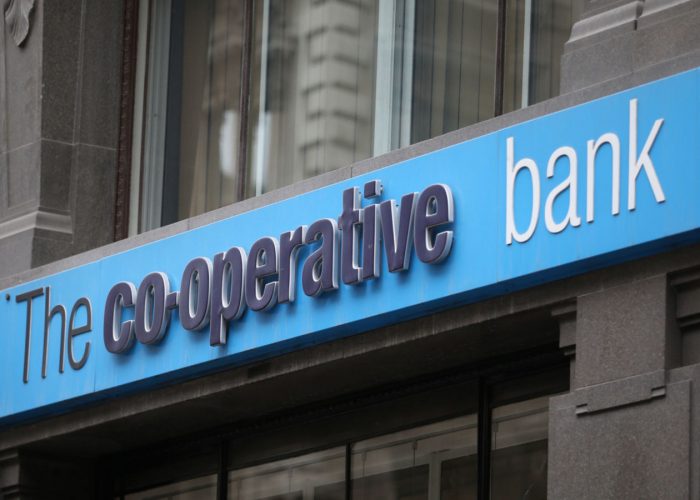



Interritus and Al Faisal are said to be prepared to take a long-term approach to reviving the bank’s fortunes
TWO Swiss and Qatari investment groups are in talks about leading a takeover of the Co-operative Bank, reviving hopes that the struggling lender could be sold outright to new long-term owners.
Sky News has learnt that Interritus Limited, which is run by a German financier, and Al Faisal Holding have held several rounds of talks with the Co-op Bank’s board and advisers.
The current status of the discussions was unclear on Thursday, and sources cautioned that there were a series of significant hurdles to any deal being agreed.
The consortium is understood to be being led by Interritus, whose boss, Patrick Bettscheider, has been involved in the rescue of Kommunalkredit, a large Austrian lender.
Al Faisal itself has had no exposure to the British financial services or banking sectors, and according to its website it largely operates within industries such as education, hospitality, logistics and transportation.
Its principal financial services activity appears to be through International Financial Securities, a Qatar-based company which offers brokerage and trading services.
A source close to the Co-op Bank said that Interritus and Al Faisal were prepared to take a long-term approach to reviving the fortunes of the Co-op Bank, and that it was attracted to its ethical credentials.
The consortium is understood to have lined up a team of advisers to aid its potential bid for the Co-op Bank, which needs to find roughly £750m of new capital in the next few months to avoid being wound up by the Bank of England.
UK banking regulators have been kept informed about the interest in the Co-op Bank, although its views about a possible transaction are unclear.
The main objection to the consortium’s takeover proposal is expected to come from a group of hedge funds which already control most of the Co-op Bank’s bonds and shares.
Those funds are keen to agree the terms of a deal under which they themselves would inject new money, rather than cede ownership of the bank to an outside investor.
It is not clear whether Qatar’s dispute with its Gulf neighbours, which blew up spectacularly this week, will have any bearing on the ability of companies based there to invest overseas.
On Thursday, Standard & Poor’s, the rating agency, downgraded Qatar’s sovereign credit rating to AA- because of the dispute.
Sources close to the Co-op Bank have anticipated for several weeks that it would issue a statement saying it was no longer pursuing an outright sale following its announcement in February that its board was seeking a buyer.
However, the talks with Interritus and Al Faisal are said to be the main factor in it not having done so.
In a statement issued on 7 April, the bank said that all of the proposals it had received involved some form of liability management exercise – which would involve swapping some of its debt mountain for new shares.
Virgin Money and CYBG, the owner of the Clydesdale and Yorkshire banks, had both explored offers but decided against making formal bids.
Last month, Sky News revealed that a committee of hedge funds holding most of the Co-op Bank’s bonds and shares are close to presenting the terms of a revised rescue deal.
The investors – Blue Mountain Capital Management, Cyrus Capital Partners, GoldenTree Asset Management and Silver Point – are trying to get the outline of a deal to inject new funds into the Co-op Bank agreed this month.
The bondholder group and its advisers have also been in talks with the Prudential Regulation Authority (PRA) to argue that the level of new capital required to secure a financial restructuring of the Co-op Bank is lower than the lender has publicly indicated.
Details of their proposal remain unclear, although it would have to involve the provision of somewhere close to the £300m of new equity that the Co-op Bank says it would require.
In March, the Co-op Bank said it would require between £700m and £750m of new top quality capital, the majority of which would be generated by exchanging some of its debt for equity – a process known as a liability management exercise.
The remainder – between £250m and £300m – would come from issuing new shares.
The hedge funds hold important cards during the talks to stabilise the Co-op Bank’s finance, and people close to the Co-op Bank pointed out that it continued to meet key regulatory capital and liquidity requirements.
It is unclear what would happen to the Co-op Group’s 20% stake in the bank under both the Qatari-Swiss and bondholder proposals.
The Co-op Group recently wrote off the remaining value of its 20% shareholding – incurring a £140m hit which plunged the supermarkets-to-insurance mutual to a statutory annual loss.
The Co-op Bank has been hit by a string of legacy issues, as well as the challenge posed by ultra-low interest rates, since its £1.5bn bailout in 2013.
The Co-op Bank’s huge pension liabilities, and their joint ‘ownership’ with the Co-op Group, remain among the major obstacles to a deal to resolve its future.
The lender announced an annual loss this year of £477m, taking its total losses since its rescue in 2013 to well over £2.5bn.
If new capital is not forthcoming, regulators would have little choice but to put the Co-op Bank into a resolution process, which would involve an orderly wind-down of the company’s operations.
At that point, the likes of Nationwide or Virgin Money could be asked to step forward to take on some or all of the Co-op Bank’s four million customers.
The Co-op Bank’s balance sheet ballooned following a disastrous merger with the Britannia Building Society, and then ran into trouble when it tried to buy more than 600 branches from Lloyds Banking Group.
Its former chairman, Paul Flowers, brought it into disrepute when his drug-taking and sexual proclivities were exposed by a tabloid newspaper, while his financial competence was questioned by MPs.
The Co-op Bank and the consortium comprising Al Faisal and Interritus both declined to comment. -news.sky.com